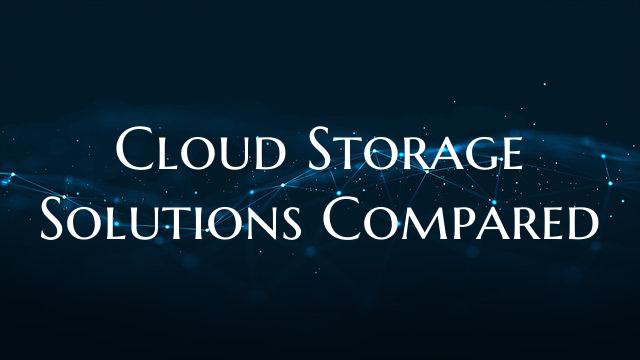Cloud Storage Solutions Compared
In today's digital age, the need for reliable and secure storage solutions for our ever-growing data is more important than ever. Cloud storage has emerged as a popular choice for individuals and businesses looking to store and access their data conveniently over the internet. There are several cloud storage providers in the market, each offering a range of features and services. In this article, we will compare some of the leading cloud storage solutions to help you make an informed decision on which one best suits your needs.
1. Google Drive: Google Drive is one of the most widely used cloud storage solutions, offering 15 GB of free storage space to users. It seamlessly integrates with other Google services such as Gmail and Google Photos, making it easy to store, access, and share files. Google Drive is known for its collaboration features, allowing multiple users to work on the same document simultaneously.
2. Dropbox: Dropbox is another popular cloud storage provider known for its simplicity and ease of use. It offers 2 GB of free storage space, which can be expanded through referrals and paid plans. Dropbox is well-suited for syncing files across multiple devices and collaborating with team members.
3. Microsoft OneDrive: OneDrive is Microsoft's cloud storage solution, offering 5 GB of free storage space to users. It is tightly integrated with Microsoft Office applications, making it a convenient choice for those who work with Word, Excel, and PowerPoint documents. OneDrive also offers advanced security features such as ransomware detection and file versioning.
4. Amazon Web Services (AWS) S3: AWS S3 is a cloud storage solution designed for businesses and developers requiring scalable and secure storage for large volumes of data. It offers flexible storage options, pay-as-you-go pricing, and advanced features such as data encryption and lifecycle management. AWS S3 is ideal for companies dealing with big data and complex data storage requirements.
5. Apple iCloud: iCloud is Apple's cloud storage service that seamlessly integrates with Apple devices such as iPhones, iPads, and Mac computers. It offers 5 GB of free storage space and provides features such as iCloud Drive for file storage, iCloud Photo Library for storing photos and videos, and iCloud Backup for device backups.
In conclusion, the choice of a cloud storage solution depends on factors such as storage space requirements, integration with existing services, collaboration features, security, and pricing. Each of the cloud storage providers mentioned above has its strengths and weaknesses, so it's essential to evaluate your specific needs before selecting the one that best fits your requirements.

